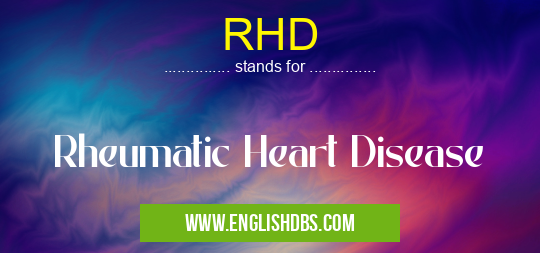What does RHD mean in PHYSIOLOGY
RHD stands for Rheumatic Heart Disease, a type of heart condition caused by streptococcal infections. It is a chronic disease that can lead to permanent and often fatal damage to the heart valves. RHD is common in many parts of the world, especially in developing countries where poor hygiene and access to health care are major contributing factors. It affects both adults and children with no distinction based on age or gender. Though serious, RHD can usually be managed through long-term medication and lifestyle changes if early diagnosis is made.

RHD meaning in Physiology in Medical
RHD mostly used in an acronym Physiology in Category Medical that means Rheumatic Heart Disease
Shorthand: RHD,
Full Form: Rheumatic Heart Disease
For more information of "Rheumatic Heart Disease", see the section below.
» Medical » Physiology
Symptoms Of RHD
The most common symptom of RHD is chest pain caused by strain on affected valve(s). Other symptoms include fatigue, shortness of breath during physical activities, palpitations or abnormal heartbeat sensations, dizziness or fainting episodes due to low blood pressure, swelling of legs due to poor circulation or fluid accumulation in lungs causing difficulty breathing.
Diagnosis Of RHD
RHD can be diagnosed by listening for a murmur heard while taking a patient’s pulse; this is typically indicative of regurgitation resulting from faulty valve function. Additionally, echocardiogram imaging tests may be used to visualize any structural deformities that could explain why a valve is unable to close properly leading to regurgitation. Furthermore, lab testing may be conducted in order to detect antibodies which serve as indicators for RF. These tests are essential for early detection as they enable proper diagnosis and appropriate treatment before any further damage can occur.
Treatment Of RHD
Treatment options depend on severity of symptoms present but commonly involve one or more types of medication such as antibiotics, anti-inflammatories, corticosteroids or immunosuppressants which help reduce inflammation caused by autoimmunity associated with RF infection as well as manage symptoms such as chest pain and shortness of breath. Lifestyle changes such as quitting smoking and avoiding stressful situations may also be recommended when managing chronic diseases such as this one.
Essential Questions and Answers on Rheumatic Heart Disease in "MEDICAL»PHYSIOLOGY"
What is Rheumatic Heart Disease?
Rheumatic Heart Disease (RHD) is a chronic autoimmune disease that affects the heart valves, making them stiff and partially blocked. This results in heart murmurs, chest pain, shortness of breath and fatigue due to poor blood flow. It has been linked to childhood infections with Group A Streptococcus bacteria, which can cause rheumatic fever if left untreated.
What are the symptoms of Rheumatic Heart Disease?
The most common signs and symptoms of RHD include heart murmur, chest pain, shortness of breath and fatigue. Other less common symptoms include an irregular heart rhythm (arrhythmia), enlargement of one side of the heart muscle (dilation) and palpitations or feeling like your heart is pounding or racing faster than normal.
How is Rheumatic Heart Disease diagnosed?
Diagnosis for RHD starts with a physical examination by your doctor along with listening to your heartbeat for any unusual sounds. Your doctor may also order tests such as an echocardiogram or an MRI scan to get a better look at your heart structures. Blood tests may be conducted to check for evidence of past infection with Group A Streptococcus bacteria.
Is there a cure for Rheumatic Heart Disease?
Unfortunately, there is no cure for RHD; however, early diagnosis and treatment can help reduce the risk of complications associated with this condition. Treatment typically involves controlling inflammation with medications such as aspirin or ibuprofen as well as antibiotics to prevent further infection from Group A Streptococcus bacteria.
Who is at risk for developing Rheumatic Heart Disease?
Children aged 5-15 years are most likely to develop this condition after having had a throat infection caused by Group A Streptococcus bacteria that was not treated properly during the acute phase. Those living in developing countries are more prone to this disease due to lack of access adequate healthcare services.
Can Rheumatic Heart Disease be managed over time?
Yes, it can be managed through early diagnosis and proper treatment including antibiotics as well as regular monitoring and lifestyle changes such as avoiding alcohol consumption, quitting smoking if necessary and managing stress levels. However, it may require lifelong medication in order to control inflammation.
Is surgery needed in some cases of Rheumatic Heart Disease?
Surgery may sometimes be necessary if severe damage has occurred within the heart valves or other structures due to long-term inflammation from the disease process itself. Surgery could involve repairing damaged valves or replacing them entirely depending on severity.
Final Words:
Rheumatic Heart Disease (RHD) is an inflammatory condition which causes damage to heart valves resulting in regurgitation and other potentially life-threatening complications. Although it mostly affects young children living in countries with high poverty rates who lack proper healthcare services; anyone exposed to strep throat bacteria can contract this disease making diagnosis prior its onset especially important for effective prevention strategies implementation strategies including medications tailored according management needs determined after diagnosis thus avoiding any further complications like those frequent seen with chronic conditions.
